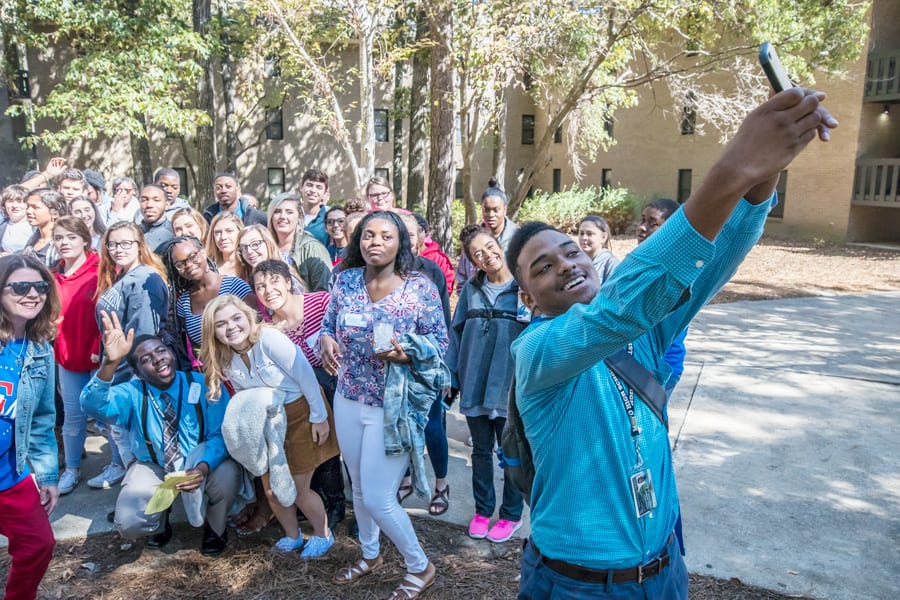October 24, 2018

FMU’s Teacher Cadet program fills the ranks of region’s schools
School’s participating in this year’s Teacher Cadet program: Latta High School, Dillon High School, Lake City High School, Marion High School, Marlboro County High School, Timmonsville High School, Lakewood High School, Crestwood High School, Hartsville High School, Sumter High School, Mullins High School, Scott’s Branch High School, South Florence High School, West Florence High School, East Clarendon High School, Wilson High School, Hannah Pamplico High School, Kingstree High School, Mayo High School for Science, Math, and Technology, Dillon Christian School, and The King’s Academy.
One of the first professional programs at Francis Marion University was in education. University leaders and supporters realized early on that a critical part of the university’s mission would be, and should be, supporting education across the Pee Dee and the state.
Five decades later, FMU’s commitment to that goal remains strong.
The School of Education is continuing to produce new educators and enhance the careers of existing teachers with its graduate programs.
It’s also reached a little farther down the pipeline to identify and encourage promising high school students with a bent for teaching.
FMU’s Teacher Cadet program, which is aimed at high school juniors and seniors, is now the largest program in the state. More than 200 students from 22 schools are enrolled in the program, which offers students a peek into both the college classroom and the teaching profession.
Dr. Polly Haselden, Associate Professor of Education and director of the Francis Marion Teacher Cadet program, says FMU’s program is providing an important service to the community, while offering some tangible benefits to the university as well.
“The Teacher Cadet program gives students a step into our program before they’re students at Francis Marion,” Haselden says. “And, it opens the doors to new teachers entering our schools, too. (Students) just don’t know how much they’ll like it until they’re there. They get there and say, ‘Wait a minute. This is fun. I like this.’”
And a new teacher is born.
That’s important. South Carolina faces a significant shortage of teachers already, and organizations like the state-run Center for Educator Recruitment, Retention and Advancement (CERRA), which supports teacher cadets across the state, says it is only going to get worse as the state grows and the teacher population dwindles.
The Teacher Cadet program functions as a hybrid high school and college course, introducing juniors and seniors in high school to advanced classroom experiences Monday through Friday. Participating students receive dual course credit in high school and are concurrently enrolled as a student at FMU in Education 190 The Student, The School, and The Community. They earn three hours of college credits upon completing the course, a useful head start on an undergraduate degree in Education.
The curriculum for the courses is approved by CERRA and taught by designated teachers in those schools trained in the curriculum. Students also spend time in local schools, observing or assisting ongoing classes. Teacher Cadets must maintain a GPA of 3.0 or better overall, while enrolled in the course.
The program is a win-win for all involved, says Haselden. Students acquire valuable experiential learning, college credit in high school. Participating schools receive vital hands-on assistance and the satisfaction of playing a role in developing potential future educators, many of whom return to their home districts upon graduation.
FMU produces more than 60 Education graduates a year. Most of them go directly into schools. Many stay in the Pee Dee Region around the university.
“When I go into high schools, I’m always shocked by how many teachers I meet that graduated from Francis Marion,” says Haselden. “I was at Latta High School a few days ago and (every teacher) that I saw was an FMU graduate.”
“It’s a great recruiting tool for the University, too” Haselden says. “I can’t tell you how many students I’ve had show up in my class and say, ‘I had you while I was a Teacher Cadet.’”
FMU has grown its Teacher Cadet program continuously since its inception. Steady growth has meant a manageable program that puts the experience of the student first, prompting a more positive Teacher Cadet experience and a higher likelihood of becoming an educator.
Haselden says the impact and influence levied by the Teacher Cadet program on future educators is incalculable.